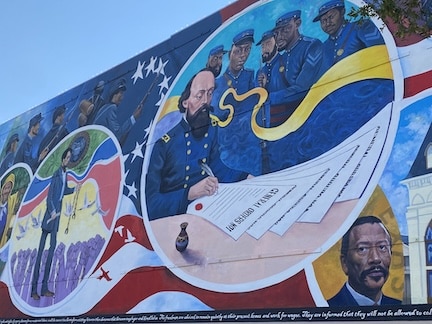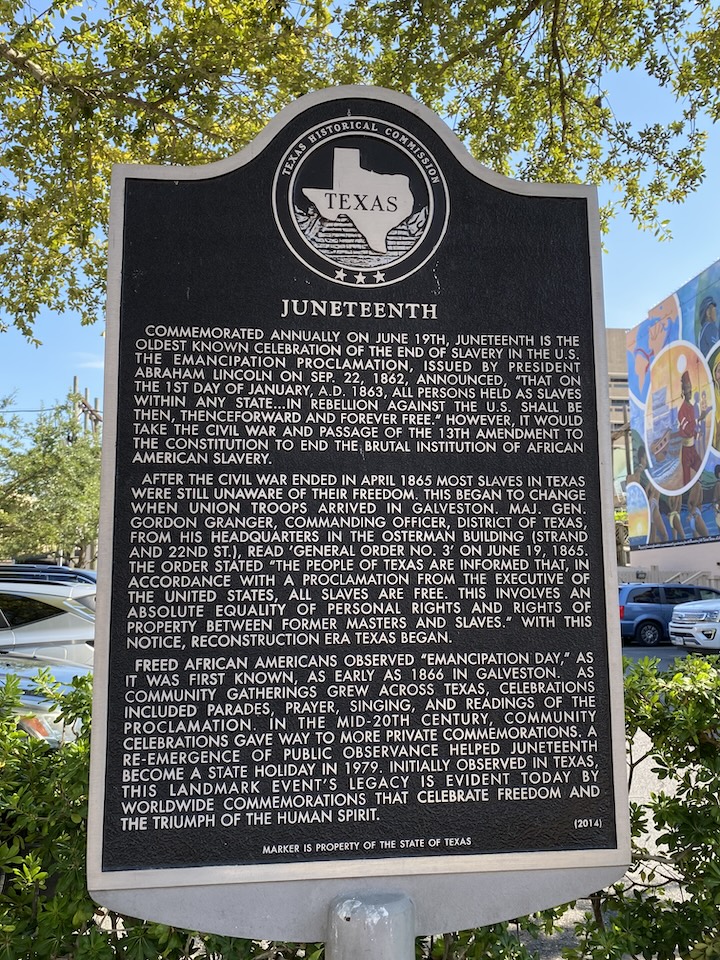On Juneteenth

I’ve had the chance to do a few talks this week, during which the “Juneteenth” holiday has come up. “Why the 19th of June chosen as the holiday?” people have wondered.
Well, most importantly to me, June 19 is my birthday, so I’m glad that it’s now rightfully being recognized as a federal holiday. Thank you.
But on a more serious note, the day might seem like a curious choice as compared to, say, the day the 13th Amendment was ratified (December 6, 1865). That’s when slavery officially ended, which is really what the Juneteenth holiday commemorates—the abolition of slavery. By comparison, June 19, 1865, was merely the date that Maj. Gen. Gordon Granger’s order affirming emancipation reached enslaved people in Galveston, Texas. The episode demonstrates just how limited in power the Emancipation Proclamation had been, issued two and a half years earlier. Here were people held in slavery in an area of rebellion, and look how little impact the Emancipation Proclamation had had on them.
And yet Juneteenth has enormous symbolic value. It is a celebration of spirit, not of law.
That’s the same reason we don’t celebrate America’s birthday on the date when the Constitution was finally ratified, June 21, 1788. Legally, that’s when the United States of America was formally established as a working government. Instead, we celebrate America’s birthday on July 4, 1776, when the Declaration of Independence was finalized. But for all the Declaration’s wonderful language and noble sentiments, Washington still had to win the war on the battlefield in order for the document to stick.
Legally, the Declaration didn’t mean a whole lot (and still doesn’t). Yet we trace our founding moment to the Declaration because it captured the spirit of the times, of the moment, of the people.
Juneteenth did the same thing for enslaved people who suddenly found their own independence—and what a joyful, joyous occasion it was.

Thank you, I know that Juneteenth has been observed in Texas for quite some time before it was instituted as a national holiday. A legal document is just a piece of paper, whereas Juneteenth commemorates the emotional side of the end to slavery and the joy they experienced upon hearing the news.
Happy birthday wishes, also!!
Thanks!
Indeed, for not only did slavery not legally end until December 6, 1865, but it was still in full swing in West Virginia, and perhaps other states that remained in the Union…the side that was supposedly fighting to end slavery. As such, it demonstrates how horribly Civil War history has been distorted by current professional historians and history professors in order to suit bogus 21st Century political ideologies. It is time to once again begin telling the truth about the Civil War, slavery, and American politics, law, society, economy and government from 1750-1775. It’s what I grew up on.
West Virginia ended slavery on February 3, 1865. Missouri and Maryland ended slavery before that. Kentucky and Delaware had slavery up to the ratification of the 13th Amendment. You’re wrong about Civil War history. The Civil War provided the opportunity to end slavery.
I don’t celebrate Juneteenth. It was created to appease loudmouth racist activists.
You don’t need to celebrate the day if you don’t want to, but your ancestors weren’t held in bondage for centuries either, were they? It’s too bad you let politics get in the way of what is otherwise a moral victory for America in its abolition of slavery.
Chris,
Read the Declaration of Independence again, in detail, to see the legal charges against the King of England. Your comments about the “Spirit of the moment,” miss completely the detailed elucidation by Jefferson of the violations committed by the King. And it still stands as a denunciation of crimes committed against the American colonists. It is much more than a “Spirit of the Moment,” document. The signers were prepared to die for their cause. And that makes all the difference.
Actually, I am super conscious of what the Declaration says, and as it happens, I have been deeply steeped in it for months because of my current writing project. The Signers pledged their fortunes, lives, and sacred honor, which IS all the difference–and which is a spirit thing, not a legal thing. But thank you for presuming to offer an explanation–you demonstrate the very “forest for the trees” mindset that bedevils people who miss the point of the Declaration AND Juneteenth. If you don’t think people in bondage were dying because of their situation, you’ve turned a very blind eye to American history.
Hope you have a very happy birthday Chris!
Thanks!
The Declaration is justly celebrated as setting down the foundational principles of our Revolution, principles that our Constitution and Bill of Rights created balanced structures for to hopefully preserve. Lincoln based his Constitutional theory on the “nation” having begun with the Declaration. Jefferson’s language had as much resonance as several batteries of Henry Knox’s artillery. Similarly, the Ratification of the 13th was absolutely essential to prevent second guessing over the continuing validity and vitality of the Emancipation. Against this, Granger’s actions in Galveston seem to me of modest general, and geographically limited, application.
Now, why Machowski’s Natal Day isn’t an Intergalactic holiday, I cannot rationally explain???
I think its an okay reason (official end to slavery) to have an official recognition. I’ve always associated summertime with freedom. I think that has to do with my old school days, when we all got a long Summer break. Plus the warm weather “liberates” many of us from the ‘restrictions’ we might encounter from the cold weather. While Memorial Day is viewed by most as the unofficial start of Summer, by the calendar the Summer doesnt start until June 21 (or 22, I’m never sure which one!). With June 19 being the Juneteenth holiday, it looks like a great way to help welcome the ‘freedom’ the Summer represents. Plus it can be a boon to commerce in the way of the sales many establishments engage in during other holidays. It seems like a yet another great reason to have a cookout if the weather allows. We remember those who fell in service to this country on Memorial Day, being able to celebrate freedom for folks who had never been able to do so via Juneteenth is a good thing. To me anyways.